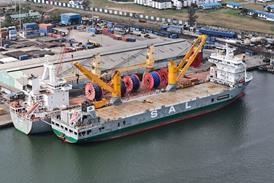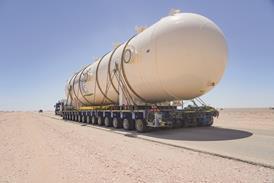SAL Heavy Lift said that it has become the first shipping company in the world to introduce hydrogen/methanol emission reduction technology to its fleet.

The heavy lift carrier said the FS MARINE+ system, developed in partnership with Fuelsave, significantly reduces carbon dioxide (CO2), sulphur oxide (SOx), nitrogen oxide (NOx) and other particulate emissions. This is done by injecting a mix of hydrogen, oxygen, water and methanol into selected parts of the air intake of both the main engine and the auxiliary engines.
This, according to SAL, ensures a much cleaner and thorough combustion process, resulting in reduced primary fuel consumption while lowering emissions and air pollution.
The FS MARINE+ generator has proven to reduce CO2 emissions by 10 percent, SOx by 15 percent, NOx by 30-80 percent, and particulate emissions by 40 percent. The system is compatible with MDO, MGO, HFO, LSFO as well as LNG fuels.
After more than four years of close cooperation, testing and development between SAL and Fuelsave, alongside project stakeholders EcoTune Marine, classification society DNV GL, Carl Baguhn, MAN Energy Solutions, M.A.C. System Solutions, AVL and the flag state administration of Germany, the FS MARINE+ solution is entering the next stage of validation, after which it will be installed aboard SAL Heavy Lift ships.
Sebastian Westphal, chief technical officer of SAL Heavy Lift, said: “SAL has always been a frontrunner when it comes to innovation and we are dedicated to make shipping more efficient and cleaner by using technologies that create a long-lasting effect.
“We have tested a prototype on a generator engine of our Annette for more than two years with very convincing results. The FS MARINE+ system not only achieved significant fuel savings, but also emission and air pollution reductions which was verified by third-parties both during field trials and in laboratory tests.”
Jakob Christiansen, naval architect and head of SAL’s fleet development team, said that millions of dollars have been invested in order to bring this system to market, but the cost and environmental benefits are substantial: “We ran the system for two years without a single incident and obtained results that matched the promised numbers. So, we see a technology that meets our green ambitions while also reducing the technical operating costs of the ships.”
SAL’s heavy lift ship Trina will be retrofitted with the FS MARINE+ system in the first quarter of 2020, with five further ships to follow.
















